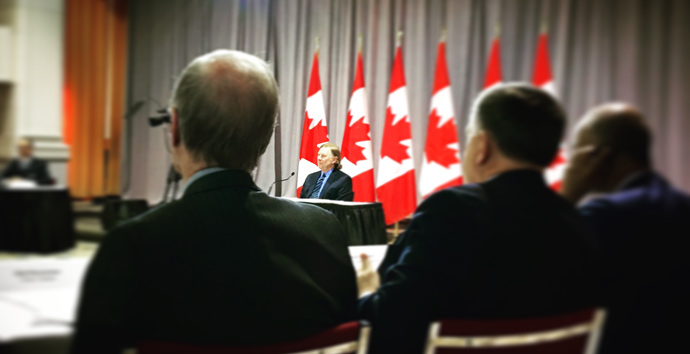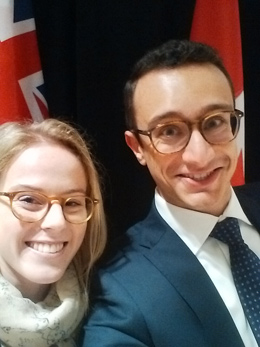Two U of T Law JD students had the opportunity to attend the Parliamentary Q&A with Supreme Court of Canada nominee Justice Malcolm Rowe. They have each sent in observations about this rare experience.

By Julia Tory, 1L
This week I was fortunate to be one of two University of Toronto Faculty of Law students invited to Justice Malcolm Rowe’s Q&A session with the Justice Committee. As a new law student, I am incredibly grateful to have been given this exciting and informative opportunity.
Justice Rowe is an understated man. He began the Q&A session with a personal statement that highlighted his modest upbringing in St. John’s and the opportunity to be the first in his family to receive a higher education. He spoke of how it is important the Supreme Court have no blind spots, as its decisions have different impacts throughout the country. As a Judge from Newfoundland and Labrador, Justice Rowe stated, he could provide an important and necessary perspective on the Court. Throughout the statement, he demonstrated his proficiency in both English and French, transitioning between the languages with relative ease.
Due to the new SCC application process implemented under Justin Trudeau, Justice Rowe had to fill out an application for the vacancy in the Court. As a result, many of the questions fielded during the session were drawn from statements made by Justice Rowe in his application, especially with respect to his comments about the role of the Supreme Court in making law. Justice Rowe eloquently explained the different sources of law in Canada and the role of the SCC in each area.
Another central theme throughout the session pertained to Justice Rowe’s ability to represent Canadians. Justice Rowe explained that in addition to his strong roots to Newfoundland and Labrador, which enable him to represent the eastern coast on the Court, his extensive travels throughout the county endow him with the ability to represent all Canadians. The law, he stated, is highly contextual. As such, the ability to understand the circumstances of various groups throughout the country is an essential requirement of a Supreme Court Judge. Building on this, he was challenged by Senator Mobina Jaffer about the lack of racial diversity on the Court. Justice Rowe explained that, while its composition was not up to him, he would work to ensure he remains aware of the diversity of circumstances faced by the people of Canada.
Justice Rowe also spent time discussing the issue of reconciliation with the Aboriginal peoples of Canada. Justice Rowe emphasized the sui generis nature of Aboriginal title and the need to approach Aboriginal rights through the Aboriginal perspective. He went on to say that the ambiguity of some recent Court decisions in the area is understandable. He said that reconciliation is a process between two nations, and the courts should stand a little apart from that process.
In his final question, Justice Rowe was asked why he wanted to be a Supreme Court Justice. In response, he stated that he had struggled with the decision to apply for the vacant position. He loves Newfoundland and Labrador, and the decision to leave was tough to make. Despite this, however, Justice Rowe articulated that he felt a duty to give back to the country that has given him so much.
By Matthew Cressatti, 2L

JD students Julia Tory and Matthew Cressatti at
the SCC nominee question session
What values do we want in a Supreme Court justice? What criteria are indicative of an individual’s ability to thrive in the Supreme Court? These were live questions this week, as Justice Malcolm Rowe, the government’s nominee for the vacant SCC seat, fielded questions from a panel largely composed of members of the Senate and House of Commons justice committees. I was fortunate to be one of two University of Toronto Faculty of Law students invited to the event. It was an incredibly educational and insightful opportunity, and I am grateful that faculty administration made it possible.
The Q&A session began in a modest way. While the panelists chatted among themselves, a middle-aged Caucasian man of average appearance, save his nearly shoulder-length strawberry-blonde hair, was suddenly at the front of the room. The room fell quiet as he unassumingly walked to a central table, poured a glass of water, and took his seat. After a short introduction from the moderator, Professor Daniel Jutras of the McGill Faculty of Law, the session began.
Justice Rowe began with a prepared statement outlining his background. He discussed his modest upbringing St. John’s, explaining how his parents had emphasized the importance of helping others. His passion for maritime law was readily apparent, as he eagerly discussed his role in negotiating Canada’s maritime border with France (via Saint Pierre et Miquelon), in crafting a new UN convention on high seas fisheries, and finally his role in the Turbot War. Later in the session he said that having to leave Newfoundland was a major drawback in his decision to apply.
Justice Rowe acquitted himself of all questions with ease. His calm and personable demeanour was clear in his answers. A number of his interlocutors questioned him on his statement, made in his application questionnaire, that judges make law. He had a sound reply, stating that, in non-Charter cases, the court merely seeks to apply the meaning of statutes to situations; and that in Charter cases the court merely acts to ensure that governments are not acting in a proscribed manner. When the question was later repeated he doubled-down, explaining that he only sought to apply legislation as it appeared, and that he welcomed clarifications from legislatures in the form of amendments.
Justice Rowe was also questioned about his views on a variety of social issues in Canada. He endeavoured to explain that he has not and will not ensconce himself in an ivory tower but will instead seek to understand the realities of life for all Canadians. He felt that courts could do more to address Canada’s access to justice crisis by simplifying procedure and lowering costs while also allowing counsel to appear on a limited basis for a party. He felt that any solution to the crisis would require collaboration between courts and governments.
A number of questions were directed at Justice Rowe’s beliefs about aboriginal law and on indigenous issues more broadly. On the topic of Aboriginal property rights Justice Rowe emphasized the need to understand Aboriginal title as sui generis, and that courts and the public need to recognize and respect pre-contact indigenous systems of government and land holding. Senator (formerly Justice) Murray Sinclair asked Justice Rowe to state his opinion on the SCC’s role in nation to nation reconciliation. Justice Rowe emphasized the need for reconciliation in Canada and the need for this reconciliation to have mass buy-in from all involved parties. He said that the court’s role is to ensure that rights are protected and that procedures are followed while settler and indigenous institutions continue to strive towards reconciliation.
This was the last time that Justice Rowe will ever be required to answer questions about himself, his ideas, or his understanding of Canada. Justice Rowe endeavoured to show that he does not consider himself a King, but instead simply as a man trying to deliver justice to the people. Justice Rowe will likely not be an activist judge. In response to a question on the central role of a judge he simply replied “to do right according to law”.


